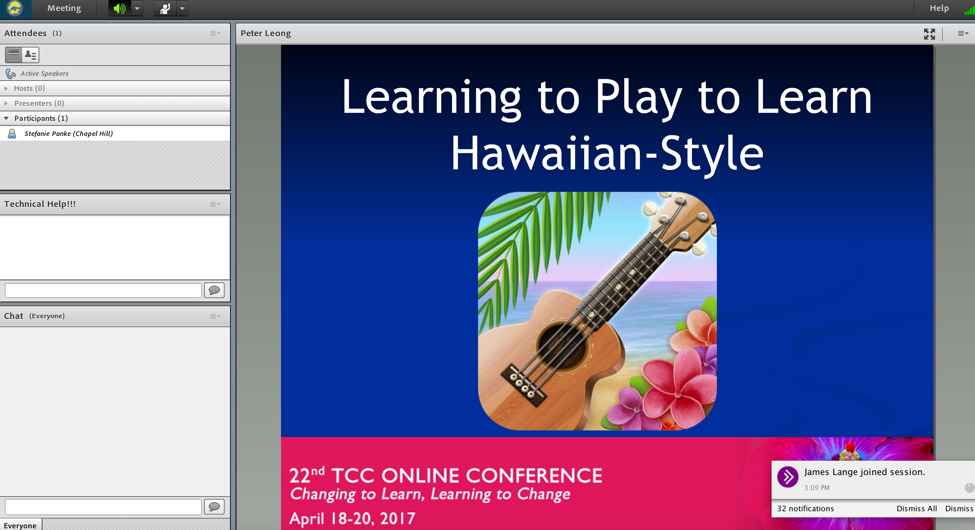TCC 2017: Changing to Learn, Learning to Change
 “The question is no longer whether or not impactful informal learning is happening in online spaces, rather the question is how will we research learning and learners within and across online spaces in order to better understand the confluences of meaning making that are occurring in diverse social media spaces” (Gerber & Lynch, 2017, 168).
“The question is no longer whether or not impactful informal learning is happening in online spaces, rather the question is how will we research learning and learners within and across online spaces in order to better understand the confluences of meaning making that are occurring in diverse social media spaces” (Gerber & Lynch, 2017, 168).
Several hundred attendees enjoyed three days packed with information and discussion at the 22nd Annual TCC Worldwide Online Conference, held from April 18-20, 2017. The acronym TCC stands for Technology, Colleges and Community. Organized by the University of Hawaii,
TCC is the oldest running worldwide online conference designed for university and college practitioners. Addressees include faculty, academic support staff, counselors, student services personnel, students, and administrators. Most sessions are held in Blackboard Collaborate.
A particular feature of TCC are student presentations. Graduate students from Department of Educational Technology at the University of Hawai’i at Manoa take a two-semester course sequence in their last year in which they design, implement and analyze their capstone project and ultimately they present the results at the TCC online conference. That is a great example of having a legitimate performance experience. The community of practice that students get exposed to is usually primarily limited to the immediate department where they are enrolled.
In this case, technology offers the potential for international interactions that can link to a far wider community and encourage future professional connections. The growth of virtual conferences is not only positive for faculty impacted by budget cuts, but has high potential as a tool for authentic assessment in higher education graduate programs.
An outstanding example was presented on the first day of the conference: Dr. Luisa Castro, the Agricultural Farm Food Safety Director for the Hawaii Department of Agriculture (HDOA), presented the findings of her Ph.D. thesis.

In her thesis she investigated social presence, the degree to which a person is perceived as a ‘real person’ in the computer mediated communication environment. She set up a mixed method multiple case study using presentations from TCC 2016 as a data source. Luisa contextualized her work within the community of inquiry framework, and walked the attendees step by step through her research questions and methods. She offered practical advice for online presenters to consider for increasing social presence:
- Include a biography with professional, academic and personal information.
- Provide a photo in the introductory slide.
- Offer ways for participants to connect after the conference via email and social media.
- Give continuous feedback verbally or by chat (may require assistance).
- Use a tone of voice that is engaging, friendly and positive.
Another recurring element of TCC conference are invited regional speakers, who this year represented the Americas, Asia and Australia as well as Europa and the Middle East.
Peter Leong’s presentation on day 2 had lots of Aloha spirit as he explored the topic of game based learning through varied case studies and best practice examples. Read the excellent summary in the TCC conference blog.

Among the guest speakers, I particularly enjoyed the talk by Prof. Dr. Mikhail Fominykh from Molde University College (Norway) on wearable technologies and the EU-funded WEKIT project. His talk focused actually less on wearables and more om augmented reality as “technology that overlays the physical world/reality with a layer of digital information”. He awed his audience with a demonstration of ‘ghost hands’.
[vimeo 133828847 w=640 h=360]
GhostHands demo: Augmented Reality tele-assistance with hands-on instruction from Giuseppe Scavo on Vimeo.
My personal conference highlight was the keynote by Dr. Hannah R. Gerber, Associate Professor of Literacy at Sam Houston State University. “There are more Internet connected devices than there are people on the planet”, Hannah Gerber pointed out, “we need to figure out what that connectivity means for the way that we think, we communicate and make meaning both together and individually”. Her talk was a treasure trope of useful resources, publications and tool. Among other sites, she pointed her audience to the Digital Methods Initiative, a collection of research tools and methods for Internet Studies. How can one use social media analytics and metadata to research informal learning in online spaces?
Gerber delineated two different approaches: (1) at the outset of a study, a researcher can parse metadata to narrow a research topic and ask more pointed questions (2) after completing a study, a researcher can draw on metadata and analytics to to better understand the phenomena and broaden the area of inquiry.
Due to the time difference, I was only able to attend very few online sessions live. Being in the same ‘room’ as the presenter allows for real-time questions and discussion – and it is simply more fun – but at TCC, it is also easy to engage when watching a recording, as every talk has forum discussions attached to it. I personally would have liked to have an easier way to submit questions in advance to the presenters – especially for the keynote sessions. Maybe a good idea for future events?
Overall, TCC 2017 was a great experience that brought together students, researchers and practitioners from a variety of backgrounds. Congratulations and many thanks to the conference organizers Bert Kimura, Curtis Ho and Sharon Fowler for inviting me to this outstanding professional development opportunity!
Further Reading:
Kimura, B. Y. & Ho, C. P. (2016). The TCC Worldwide Online Conference: Twenty years of
affordable, timely professional development. International Journal for Educational Media and Technology. 10(1), 18-25. Retrieved from http://jaems.jp/contents/icomej/vol10/2_Kimura.pdf
